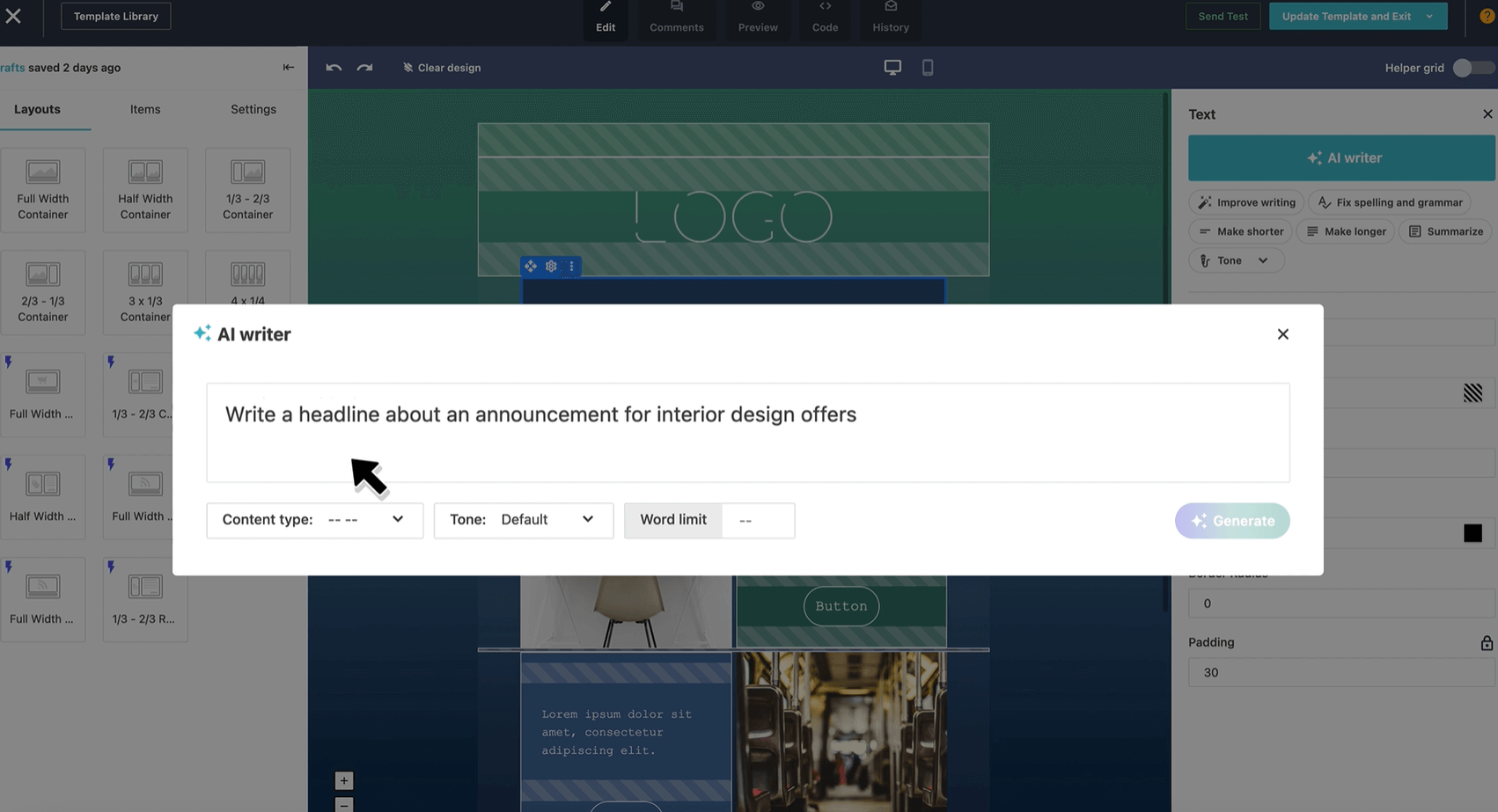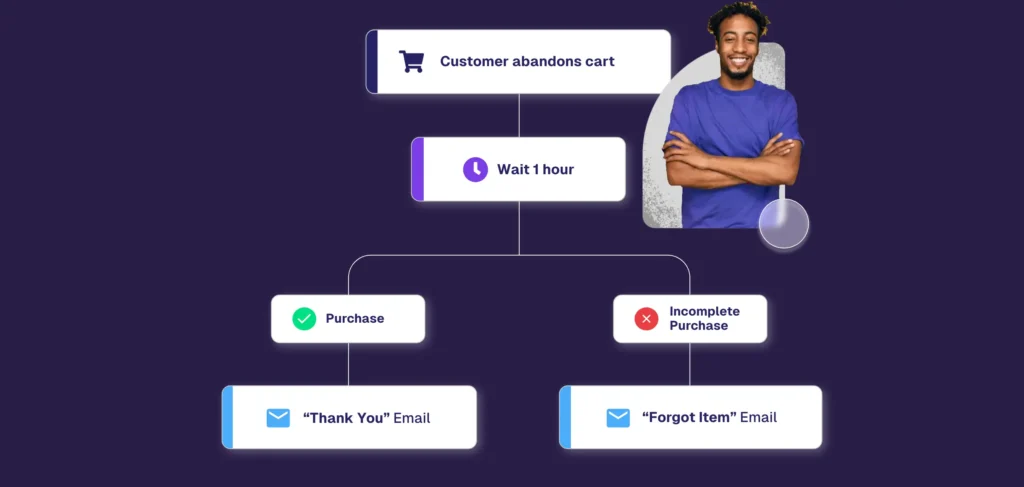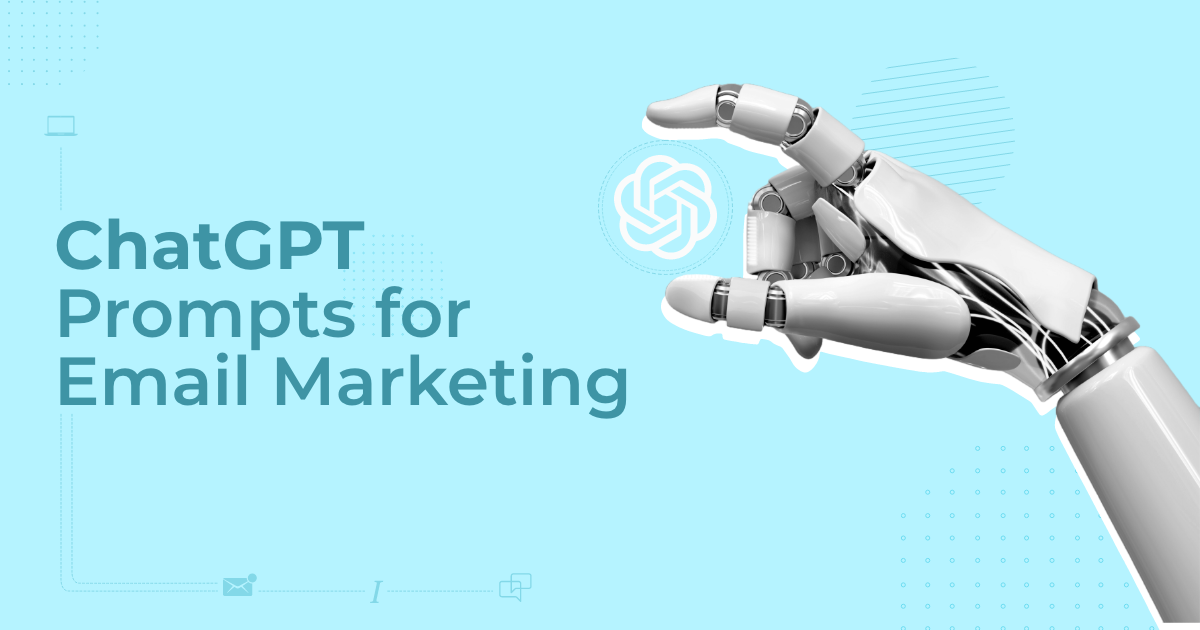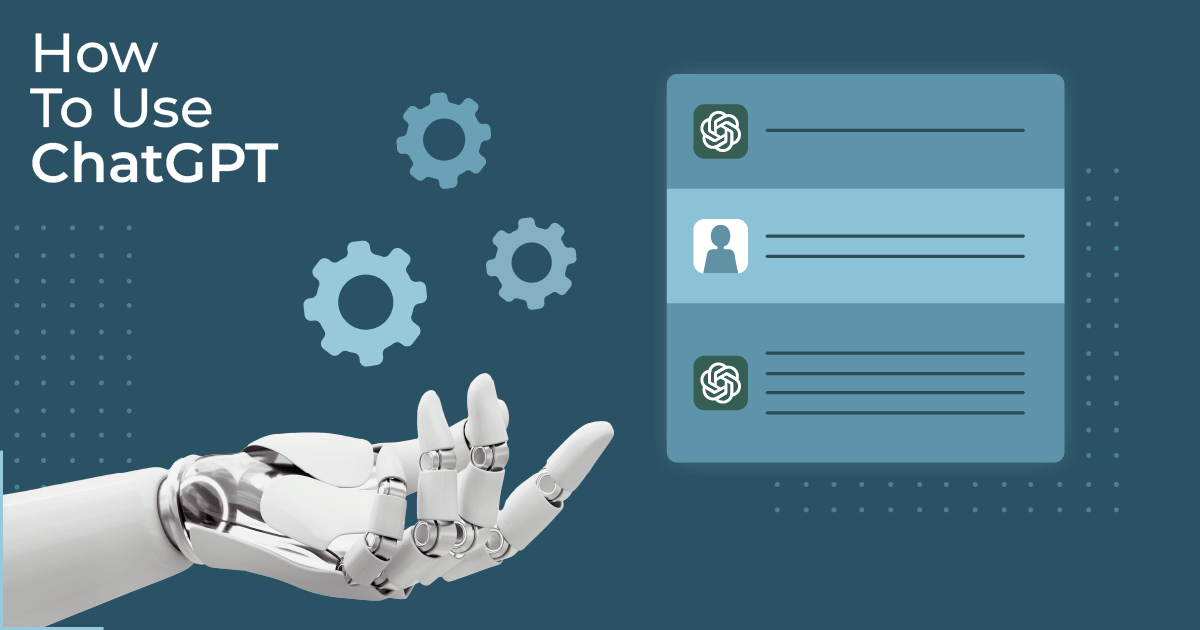
Ecommerce AI: Definition, Benefits & How to Use [2026]
It seems like everyone’s talking about artificial intelligence (AI) these days. You’ve probably noticed it popping up everywhere—from high-tech industries to everyday websites and online stores.
But if you’re in the eCommerce industry and new to AI, it can feel a bit like trying to catch up on the latest popular show that everyone else has already seen.
Don’t worry, though. We’re here to see what eCommerce AI is and show you how it can work wonders for your online business.
In this article, we’ll start with the basics and explain what AI actually is. Then, we’ll dive into the benefits it can bring to your online store, share some real-life applications and use cases, and finally, give you some practical tips on how to implement it.
What Is AI for Ecommerce?
Ecommerce AI refers to the use of artificial intelligence technologies in the eCommerce industry. By 2028, research predicts that 95% of customer interactions will be AI-powered.
AI is used throughout the eCommerce supply chain for optimization, personalization, smart product discovery and recommendations, chatbots, and predictive analytics. It helps retailers drive business growth and creates a seamless, efficient, and smooth online shopping experience for customers.
What Are the Benefits of Ecommerce AI?
Artificial intelligence has many applications in eCommerce and, therefore, many benefits, from precise audience targeting and increased operational efficiency to data-driven reputation management and large-scale personalization.
Let’s take a closer look at some of the benefits.
Precise audience targeting
AI can enhance audience targeting. It analyzes customer data, identifies patterns and preferences, and can make smart predictions about buying behavior.
Using AI-gathered insight, you can optimize recommendations and ad placements, increase engagement levels and conversion rates, and improve customer experience.
Personalization at scale
Using machine learning algorithms, eCommerce AI analyzes customer data and behavior to provide a personalized shopping experience.
It can predict a customer’s next likely purchase and recommend products based on similar interests, their wishlist items, and more.
While some level of personalization is available without AI, using e-commerce AI for personalization opens the doors to high-level personalization on a large scale.
Real-time decision making
AI solutions can make accurate sales and demand predictions using real-time data, demographics, online reviews, weather forecasts, and more.
These predictions allow eCommerce businesses to make quick, informed decisions and better adapt to changes in the market.
Increased operational efficiency
Smart logistics systems and dynamic pricing optimization are two kinds of AI tools that improve operational efficiency. They are used to automate decision-making and repetitive tasks and streamline operations.
This helps to optimize resource utilization by reducing time spent on manual tasks.
Data-driven brand reputation management
Ecommerce AI technology gives retailers unique selling points like hyper-personalization, such as personalized product recommendations, 24/7 smart customer service like AI chatbots and virtual assistants, and inventory management optimization that reduces product stockouts.
These features help to improve brand reputation and can be an important factor that boosts word-of-mouth marketing.
Increased security
Fraud detection tools that use AI algorithms provide enhanced financial transaction security and protect online shoppers and retailers from threats. They monitor multiple parameters like transaction patterns and customer behavior to identify fraudulent activity and prevent it.
How AI Transforms the Ecommerce Industry: Use Cases
Artificial intelligence has many use cases that can be applied to business functions.
They include:
- Data mining and analytics: Collect and analyze important data and leverage it to produce actionable insights that you can use to make informed decisions.
- Machine learning: Algorithms that self-learn are used by eCommerce retailers for better inventory management, sales forecasting, enhanced customer interactions at every touch point, and logistics automation for first-rate customer experiences.
- Natural language processing (NLP): Natural language models, like ChatGPT, understand human languages and use them to learn and generate responses. They are used to improve chatbots to respond to questions and inquiries with better, faster, and more accurate answers at any time of the day.
- Computer vision: Computer vision AI technology allows computers to understand, recognize, and classify images, like product photos. It is used by eCommerce businesses for smart product searches and improved recommendations.
- Deep learning: These algorithms learn complex data patterns, like language and images. NLP and computer vision are forms of AI deep learning. It is used in eCommerce for high-level personalization, particularly regarding product recommendations.
Now, let’s look at how these forms of AI are implemented by eCommerce businesses.
Recommendation engines
Recommendation engines are built on collaborative filtering algorithms. They analyze the behavior, interests, preferences, and past purchases of your customers and identify similarities and patterns.
The patterns are used to predict products that users may be interested in and provide highly personalized recommendations.
Dynamic pricing optimization tools
Using algorithms to analyze market demand, manufacturing costs, and competitor prices in real time, dynamic pricing optimization tools adjust product prices automatically. This helps maximize profit potential and ensures the best price every time.
Examples of brands that use AI-powered dynamic pricing include Uber and Amazon. Uber uses the tool to adjust ride prices according to location and demand, while Amazon optimizes its prices based on competition and real-time market conditions.

Customer support
NLP and machine learning allow chatbots to understand customer questions and respond to their inquiries using natural language. Although they aren’t fully self-sufficient and require some manual support, they can handle customer queries and provide out-of-hours assistance.
They can also collect customer feedback and undertake routine tasks, saving time for your customer support team.
Home improvement giant Home Depot provides quick and accurate responses to customer support questions, such as shipping information, thanks to its AI-powered customer support tool.

The online store’s chat system also offers instant details about free shipping, delivery fees for major appliances, and links to further information, ensuring a seamless customer service experience.
Audience segmentation
Customer segmentation tools that use machine learning can analyze customer data, identify similarities, and create customer segments that are accurate and based on a wide range of data points.
This lets businesses create tailored, personal marketing campaigns and communications for each segment.
Logistics and inventory management
Built on Internet of Things (IoT) devices like RFID (Radio-Frequency Identification) tags, sensors, smart scales, smart shelves, and drones, smart logistics systems monitor inventory levels and conditions in real time.
The data is then used to efficiently manage inventory, predict market demand, and improve supply chain operations. By maintaining optimal inventory levels, they enhance production efficiency and help curb overspending.
Walmart uses AI to predict demand and manage its warehouse inventory to save significant costs is a perfect example of how AI can revolutionize retail stock control.
Sales and demand forecasting
Forecasting tools that use AI machine learning can forecast sales and demand by analyzing data and demographics in real time and examining external elements such as the weather.
This means eCommerce companies can accurately predict sales and demand levels, better manage their inventory and logistics planning, and enhance their pricing strategies.
NLP-powered voice search
Natural language processing tools allow eCommerce retailers to optimize their stores for voice search.
This makes their websites more accessible by ensuring the product listings and other pages can be accessed through voice commands.
Image recognition and visual search
Computer vision-powered tools that use image recognition let users search for products in a store using images, kind of like Google Lens.
Users can take pictures or screenshots of things they like and use them to search for products, which helps if they don’t know what search terms to use.
Here’s an example:

Fake review and fraud detection
Fake reviews and fraud are unfortunate parts of running an eCommerce business, but AI can help deal with these issues effectively.
Using AI-driven text analysis, businesses can identify fake reviews by comparing reviews and detecting anomalies in text patterns, format, and writing styles. If the system suspects a review of being fake, it will quickly flag it, helping businesses maintain accurate and truthful customer feedback.
Additionally, AI fraud detection tools analyze various parameters related to user identification and credit card information, along with behavior and transaction patterns. By identifying irregularities and potential fraud, these tools help businesses protect themselves and their customers from fraudulent activities.
AI-powered product descriptions
Generative AI can automate writing product descriptions using NLP.
AI-powered tools that are designed for generating product descriptions specifically look at product details, AIDA (attention, interest, desire, and action) principles, and natural language techniques to create unique, engaging product content that is search engine optimized (SEO).
How to Use AI in Your Ecommerce Business
Integrating AI tools into your eCommerce store can help you streamline your operations, increase efficiency, and drive growth.
Below are some ways you can use AI in your eCommerce business.
1. Smart product recommendations
AI tools offer a higher level of personalization that allows you to provide smart product recommendations that improve customer satisfaction and experience.
Example: An online clothing store can recommend raincoats and umbrellas to customers in regions expecting rain, while suggesting sunglasses and beachwear to those in sunny areas. This kind of targeted recommendation enhances the shopping experience by presenting customers with items they are more likely to need and want.
Platforms like Moosend offer advanced eCommerce AI features to create smart product recommendation emails based on similar tastes, the weather in a given location, browsing and purchase history, and more.

It also seamlessly integrates with many eCommerce platforms, CRM tools, and more, so you can manage your product recommendations all in one place.
2. Customer segmentation
Accurate customer segmentation makes it easier to provide a personalized user experience to your customers. Email segmentation allows you to send the right content to the groups of customers it applies to and resonates with the most.
You can segment your customer list by using various categories, including demographics (age, gender, location), psychographics (interests, values, lifestyle), and behavioral data (past purchases, browsing history, product views). This allows you to create hyper-segments and send highly relevant content to each specific group.
Example: An eCommerce store specializing in home goods can segment their customer list based on:
Demographics
- Age: Younger customers get trendy decor, older customers get classic styles.
- Location: Promotions for winter bedding in colder climates, outdoor furniture in warmer areas.
Psychographics
- Interests: Emails about sustainable products for eco-conscious customers.
- Lifestyle: Multi-functional furniture for busy professionals.
Behavioral Data
- Past purchases: New kitchen gadgets for customers who bought kitchenware.
- Browsing history: Highlight new lamps for those viewing lighting options.
- Product views: Follow-up emails with discounts on viewed items.
3. AI-powered chatbots for 24/7 customer support
It can be difficult for your customer support team to keep on top of customer needs on their own. From questions pre-purchase to issues at checkout and processing returns, there is a lot for them to handle.
Customers in 2024 have high expectations, and meeting them is important. They simply don’t want to wait until Monday morning for a rep to respond to their Friday night question.
Implementing an AI chatbot allows you to provide 24/7 customer support. Also, it’s worth notcing that 80% of customers have a positive experience using them and find answers to most of their queries.
Example: An electronics eCommerce business can use AI to handle customer queries 24/7. Pre-purchase questions about product specs, payment issues during checkout, and post-purchase inquiries about shipping or returns can be addressed instantly. This ensures a smooth shopping experience and meets customer expectations, even outside business hours.
4. Improve content with Generative AI
Using Generative AI can save you a lot of time writing copy for your product descriptions, marketing campaigns, email content, social media posts, and more.
Example: Beauty brands can craft detailed product descriptions highlighting key ingredients and benefits, create engaging email campaigns promoting seasonal skincare routines, generate social media posts featuring customer reviews and before-and-after photos, and develop persuasive ad copy for marketing campaigns.
Moosend’s Generative AI is a great tool to start improving your email content. Designed to simplify your email marketing tasks, it’ll help you create engaging product descriptions, email content, and compelling subject lines, saving you time and effort.
With AI-driven suggestions based on your prompts and keywords, you can craft emails that match your brand’s voice. The AI also assists in A/B testing different versions to optimize your campaigns.

Lastly, you can increase your open rates using an AI-powered subject line tester, like Refine, which provide data-driven suggestions to optimize your email subject lines and boost open rates.
Additional resources:
- 370+ Original Ecommerce Email Subject Lines To Increase Your Open Rates
- Email Subject Line Best Practices & Tips [With Examples]
5. Dynamic pricing for increased sales
Using dynamic pricing in your online store is a great way to increase sales and profits. However, researching the right price for each item in your store takes a lot of time, especially if you have a lot of products. Then, you need to go through and manually update the price for each one.
More changes in the market? Well, it’s time to rinse and repeat.
However, AI can do all the research using big data and taking into account your manufacturing costs and competitors’ pricing, predict the ideal time to raise or lower the price, and implement the pricing changes, saving you heaps of time on manual adjustments.
Example: Sports equipment stores can take advantage of AI to track competitors’ prices, seasonal trends, and stock levels. If a competitor drops the price on a popular running shoe, the algorythm can adjust your price to stay competitive. If demand for basketballs spikes during the playoffs, the AI can increase prices to boost profits.
6. Boosting conversions by tackling cart abandonment
Cart abandonment is a significant challenge for online retailers, as it often represents lost sales opportunities.
With AI, you can retarget these customers effectively through personalized abandoned cart emails.
Example: If a customer leaves your website without completing a purchase, AI can trigger an abandoned cart email sequence. The first email could be a gentle reminder of the items left behind. If the customer doesn’t respond, a follow-up email could offer a discount or free shipping to entice them back.
Tip: Personalizing these emails with the customer’s name and showcasing high-quality images of the abandoned item can further increase the likelihood of conversion.
Moosend allows you to automate this process through their powerful marketing automation builder. Using an abandoned cart workflow to save time, you can set it to target cart abandoners with personalized content and recover lost sales.

Additional resources:
- 20+ Cart Abandonment Stats To Reduce Your Lost Sales
- Brilliant Abandoned Cart Email Templates
- Smart Abandoned Cart Subject Lines To Boost Open Rates
7. Scale shoppable emails
Shoppable emails allow the recipient to browse products and make purchases directly from their email inbox—no need to open another website or app. They increase click-through rates and conversions and are easy to implement with AI.
Example: You can send shoppable emails featuring your latest products. Customers can view details, select their preferences, and complete the purchase all within the email. With AI, these emails can be personalized to highlight products based on the recipient’s browsing history or past purchases, making the shopping experience even more tailored and efficient.
Moosend can help you with the creation of shoppable experiences, letting you add buyable products and their details directly to your newsletters. This feature allows you to showcase products from your store within your emails and automatically generate eye-catching email annotations for the Gmail Promotions Tab, enhancing visibility and engagement.
8. Sales and demand predictions
Forecasts are a great way to plan your logistics and warehouse space, manage inventory levels, and determine prices. However, using historical data only, or pairing it with seasonal data, fails to make accurate predictions.
AI makes far more accurate and reliable predictions using real-time eCommerce sales data, the performance of related or similar items, social media and online reviews, and even the weather. Plus, with machine learning, forecasting improves over time as more data is available.
Discover Smarter Ways to Grow
AI is changing the eCommerce industry by enhancing customer experience, improving operational efficiency, and driving business growth.
From smart product recommendations and dynamic pricing to 24/7 customer support and advanced logistics, AI offers several benefits that can grow your online business more efficiently. By integrating AI tools, you can stay ahead of the competition and meet the ever-evolving demands of your existing and potential customers.
Want to find out more about how eCommerce AI can help your endeavors? You can try Moosend’s powerful AI-driven features to streamline your business operations, personalize your marketing efforts, and boost your sales.
FAQs
Here are the answers to some common question around eCommerce AI.
1. How is AI used in eCommerce?
AI for eCommerce can enhance various aspects of the shopping experience and streamline operations. Among others, you can personalize content through customer data, offer 24/7 customer support with chatbots, enable dynamic pricing that adjusts based on demand and market factors, and manage inventory. Additionally, AI helps in fraud detection by monitoring transactions and customer behavior to prevent fraudulent activities.
2. Can AI improve email marketing for eCommerce?
AI can enhance email marketing by personalizing content, optimizing send times, generating subject lines, and automating email campaigns, leading to higher engagement and conversion rates.
3. What are shoppable emails?
Shoppable emails allow recipients to browse and purchase products directly from their inbox without needing to visit a separate website, increasing click-through rates and conversions.
4. How does AI handle cart abandonment in eCommerce?
AI tracks customer behavior and triggers personalized abandoned cart emails to retarget customers, offering reminders and incentives to complete their purchases.
5. Can I make an eCommerce website using AI?
Yes, you can use AI to create an eCommerce website. AI assists in designing and setting up websites through platforms like Wix and Shopify, which offer AI-powered tools.
6. What are the drawbacks of AI in eCommerce?
While AI has numerous benefits, there are also some drawbacks to consider. Implementing AI can be expensive and complex, requiring significant investment and technical expertise. In addition, AI systems use large amounts of data, raising concerns about data privacy and security, while job displacement and workforce retraining concerns are also on the rise. Another important thing to consider is that AI algorithms can have biases present in the training sets, leading to biased outcomes.
7. How big is the eCommerce AI market?
The global artificial intelligence market is estimated to be $214 billion in 2024 and is projected to reach $1,345.2 billion by 2030, growing at a compound annual growth rate (CAGR) of 35.7% during the forecast period. This growth is driven by advancements in AI algorithms, machine learning techniques, and the increased adoption of AI technologies across various industries.





